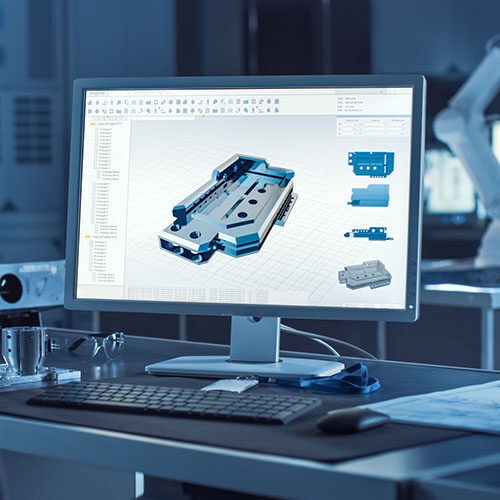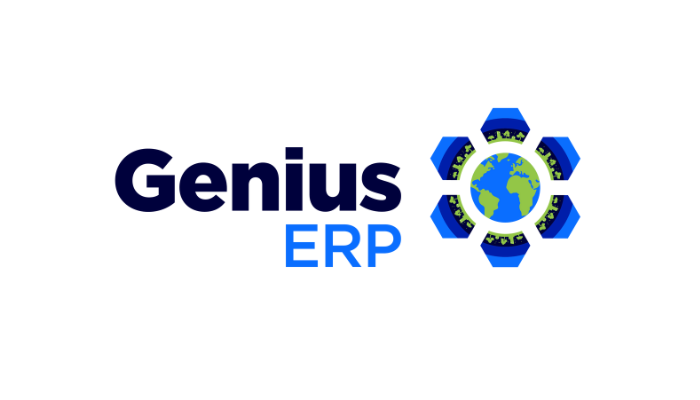
We first looked at how AI technology was impacting ERPs back in 2019. A lot has changed over the last four and half years, including many significant advances in artificial intelligence. Below, we’ll revisit our predictions for AI and the future of ERPs to see how they have evolved and what new possibilities have emerged.
What is Artificial Intelligence?
Let’s begin by understanding artificial intelligence (AI) and learning why this technology is revolutionizing industries worldwide. AI, simply put, refers to technology that simulates human intelligence and decision-making processes. This includes capabilities like machine learning and natural language processing, which enable computers to learn from data and understand human commands.
You are probably familiar with this type of technology on your smartphone, but how does it impact the manufacturing industry, and more specifically, ERPs?
AI technology built directly into ERP systems can help automate routine processes or create better user experiences by learning and adapting to user’s language, allowing systems to better understand and respond to users.
In 2017, Gartner predicted that 2020 AI technology will be in almost all new software products. Today, AI is indeed becoming ever more prevalent, with many ERP providers incorporating AI into their systems. In the past year, AI has gained significant attention, thanks in part to developments like OpenAI’s ChatGPT, which are making AI technology available to everyone. Microsoft’s partnership and hefty $13 billion investment with OpenAI shows this growth in interest in the technology — with many other big tech companies like Google and Meta also investing heavily in AI.
How Will AI Impact ERP Systems?
AI and ERPs in 2024
So, where does this leave ERP companies? Many of the biggest ERP companies are also investing heavily in AI, with smaller vendors also starting to embrace AI technology. Some examples of AI technology in ERPs are:
- SAP has created AI solutions tailored for different industries and unveiled the Joule AI copilot to make SAP business systems more accessible to everyone.
- Similarly, Microsoft has integrated various AI functionalities and virtual assistants into Dynamics 365. These enhancements simplify sales processes, enrich customer understanding, optimize supply chain operations, and combat fraud.
- Likewise, Oracle has rolled out Oracle AI Apps for ERP and introduced new generative AI features. These advancements aim to simplify the integration of new functionalities across a wide range of Oracle cloud services and industry-specific applications.
Benefits of AI
AI in ERP offers several advantages, such as:
- Predicting future trends
- Analyzing data
- Guiding purchasing choices
- Improving demand forecasts
- Facilitating human resource management (matching candidates with suitable positions)
- Targeting marketing efforts toward potential buyers
- Enhancing customer service quality
- Extracting valuable insights from data trends
How AI Shapes ERP Software
Manufacturers are looking to use smart technologies and artificial intelligence to give them a competitive edge. Machine learning and intelligent manufacturing are already helping manufacturing companies improve efficiency, for example, in terms of quality checks and maintenance. Let’s look at more areas where AI will impact ERP systems.
Data Handling and Business Intelligence
Learning how to use and leverage your data to make better business decisions is one of the biggest advantages an ERP can give you — which can give you a major competitive edge.
Manufacturing is one of the most data-intensive industries out there, and an ERP, as it is connected to your entire operation, can spit out data about every facet of your manufacturing business. Using big data can help manufacturing companies address many common problems that plague manufacturers — and can be used across your organization, not just at the C-Suite level. Access to real-time data and customizable reports empowers decision-makers throughout your organization to make faster and better decisions.
Through machine learning, AI can boost how your ERP handles and analyzes data as AI technology can analyze larger datasets than previously possible, meaning AI’s ability to work with massive amounts of data can enable better real-time, accurate data insights. For example, AI can analyze the purchasing behavior of different categories of clients, allowing you to tailor your inventories directly to your customers’ needs — something that could be important to manufacturers.
In addition, artificial intelligence can also be used to read historical data and learn from earlier behavioral patterns. This could be extremely helpful to custom manufacturers in terms of creating quotes and estimates. Building new products poses a significant challenge in creating quotes, but by deeply analyzing similar products you have built in the past, AI can give you greater insights into actual costs. This makes it easier to create an accurate quote for your customer (as well as help you to make overall better business decisions by having a better handle on job costs).
Process Automation
Automating business processes helps you to save both time and money.
When routine processes, like invoicing and month-end closing, can take hours or even days to complete, you are wasting a lot of staff time and dollars. ERPs already immensely help manufacturers in this area and improve productivity — especially for manufacturers still stuck in the world of Excel.
An ERP system can assist in scheduling, accounting, inventory management, and engineering and can automate production processes, leaving your workers with time to focus on other tasks, such as innovation and business growth. Automating your business processes with an ERP lets you do more with less, allowing you to take on more business with your current resources.
AI technology can boost your ERP’s performance in terms of process automation. AI technology, with the ability to learn and make intelligent decisions, makes routine responsibilities such as accounting and payroll administration as effortless as the click of a button. And, when integrated with an ERP system, AI can detect inefficient processes and suggest a solution that will cut costs and improve efficiency. AI also allows for predictive diagnostics, minimizing the waste of resources.
User Experience
We’re not going to lie — learning to navigate a complex system like an ERP can be a major hurdle to some manufacturing businesses. ERPs, especially when you are learning a new system from scratch, are not always the most intuitive and simple software systems to use.
This is a big area where AI technology built into an ERP system can help. Just as AI technology can learn from you and make your smartphone easier to use, AI technology can also help with complex software systems like ERPs. AI technology improves user experience through interaction.
AI makes intelligent decisions based on human input, making applications faster, more responsive, and useful to the individual user. For example, when searching through a data-rich system like an ERP, AI can tailor search results based on a user’s history, bringing up more relevant information for the user — making the system faster and simpler to use.
AI technology can easily handle structured and unstructured data and give you a business analytics tool that organizes and presents data in a clearer and more user-friendly way. Not only will the system give you better business analytics, but it can also show that data in a way that is more relevant and easier to understand — boosting your ability to make better decisions.
Conversational and Generative AI
Conversational and Generative AI could significantly advance ERP systems, improving user interactions and experiences. By integrating conversational AI capabilities, ERP vendors can empower users to engage with systems in a more natural and intuitive manner. Rather than grappling with intricate interfaces, users may simply pose questions or request data, akin to conversing with ChatGPT. For instance, users might leverage conversational AI to solicit visual representations of data trends or engage in creative comparisons between different datasets, streamlining the process of data analysis and decision-making within ERP environments.
As AI technology continues to evolve, anticipate seeing more personalized experiences within ERP systems, catering to the unique needs and preferences of customers, employees, and partners. For instance, AI algorithms could analyze user behaviors and preferences to deliver hyper-targeted recommendations, anticipate user needs, create customized workflows and automate routine tasks, enhancing overall user satisfaction and productivity within ERP ecosystems.
Third-Party AI Solutions
Beyond the built-in AI features of ERP systems, organizations can explore standalone AI solutions. These solutions complement ERP systems and offer advanced AI capabilities, which is particularly beneficial if an ERP vendor’s AI offerings are still evolving.
One of the key advantages of third-party AI solutions is their flexibility and adaptability. Unlike built-in AI features that may be limited in scope or functionality, standalone AI solutions often provide a broader range of capabilities tailored to suit diverse business requirements. This versatility could enable manufacturers to customize their AI toolkit according to their unique operational demands.
——-
ERP systems offer a significant advantage by seamlessly integrating all aspects of your business operations. AI technology elevates this integration to new heights, enhancing efficiency and productivity within the manufacturing sector. By leveraging AI capabilities, ERP systems can optimize processes and facilitate more informed decision-making, resulting in smoother and smarter operations.
As AI technology advances, we anticipate a deeper integration of its features into ERP systems. This evolution may encompass enhanced predictive analytics, improved natural language understanding, and the ability to derive insights from data. The integration of ERPs and AI presents manufacturers with significant opportunities for growth and increased efficiency, unlocking new possibilities for innovation and optimization.
Get your eBook Scared to implement a new ERP?
"*" indicates required fields



